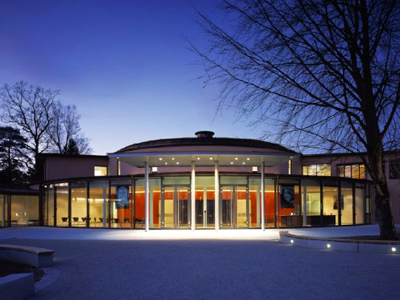
By ANDREW POWELL
Published: October 16, 2017
GRÜNWALD — In mixing-bowl terms, Berlin’s Armida Quartett and Paris’s Quatuor Modigliani combined rather than blended in a standing-room-only concert Oct. 11 here at the August Everding Saal. That is as required for some recipes, possibly including Mendelssohn’s E-flat String Octet (1825), which received a convulsive, unnuanced performance that seemed to want to come apart in loud, fragmentary gestures, pleasing the crowd anyway. More enlightening were the program’s two other half-hour works, before the break: the Mozart String Quintet in G Minor, K516 (1787), staffed by the Modigliani, and Brahms’s B-flat String Sextet, Opus 18 (1860), centered on the Armida, with the violas and fine Modigliani cellist François Kieffer doing triple duty. The French group, now in its fourteenth year, had the tighter, more reserved ensemble and sound, suiting the Mozart; the German quartet, new in 2006 and adept at winning prizes, offered more character (violist Teresa Schwamm), resonance (cellist Peter-Philipp Staemmler on a larger instrument than Kieffer’s 1706 Goffriller) and visceral abandon (first violin Martin Funda), enhancing the Brahms. Not that anyone was competing. The sextet flowed with boldness and conviction, opulent tones throughout, a warm, lyrical traversal, swept along by Funda. The cellists delighted in each other’s timbral contrasts. In the Mozart, a precise rapport among the Modigliani musicians produced intriguing balances, with Schwamm adding gradated charm. But here, as in the concluding Mendelssohn, Amaury Coeytaux’s pacing and deft fingerwork drew attention. He is the Modigliani’s new first violin: at 33 the only man on stage with a pot belly, and apparently traveling without a hairbrush. (Coeytaux joined ten months ago, in time to lead the group’s probing, pliant survey of the Schumann quartets recorded by Mirare at Evian in April. Although written together in 1842, the three Opus 41 pieces go their separate ways in terms of form and even style, something conveyed with discernment on the 79-minute disc.) Gemeinde Grünwald itself presented the concert. This leafy little city on Munich’s southern fringe, home to Bavaria Film and once home to Carlos Kleiber as well as stage director Everding, boasts a median personal income of U.S. $147,000, as compared to $64,000 for Landkreis München and $45,000 statewide. Enough for the fanciest mixing bowls.
Photo © Richie Müller
Related posts:
Meccore: Polish Precision
Horn Trios in Church
Staatsoper Favors Local Fans
Time for Schwetzingen
Carydis Woos Bamberg